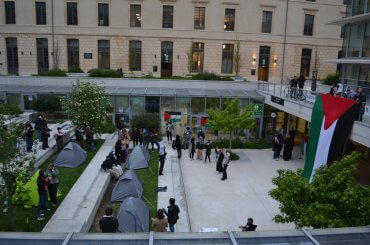Salon runs Ali Abunimah, Inside the Mideast prisoner swap, very astute analysis of the various parties’ interests and limitations… Note the respect shown to violent resistance, a respect Americans would extend to any other anti-occupation situation in the world except for this one– and props to Salon for running it.
Israel did not negotiate with Hamas because Hamas is “moderate,” any more than the U.S. has negotiated with the Taliban in Afghanistan because it is “moderate,” or the U.K. negotiated with representatives of the Irish Republican Army because they were “moderate.”
In all those cases, enemies who had previously been declared off limits (“we don’t negotiate with terrorists”) were brought into the fold because they were in a position of strength.
Similarly, the reason Israel has been willing to limit its military assaults on the Gaza Strip recently is in part because Hamas and other Palestinian factions have been able to exercise limited deterrence with their rockets.
Netanyahu will not impose a settlement freeze in response to Abbas’ demands simply because Netanyahu believes in and supports the colonization of the West Bank, and Abbas does not have the power to make him.
Israel only negotiates seriously when it feels it has no other choice and when its adversary has enough power to impose an outcome it cannot prevent by other means.
Does this mean that Hamas and Israel could potentially do a deal over the broader issues? The answer is no, but not because of the conventional wisdom that Hamas doesn’t recognize Israel, espouses violence, and refuses to accept signed agreements.
In fact, Hamas has said repeatedly — including in a New York Times interview with its leader Khaled Meshal — that the movement is willing to accept a Palestinian state in only the West Bank and Gaza Strip, provided all Israeli settlements are removed and the rights of Palestinian refugees are respected.
But while Hamas was strong in the specific context of negotiations over prisoners, the movement by itself or even in combination with other Palestinian factions is not strong enough to compel Israel to meet broader demands.
The power balance remains too lopsided against Palestinians for negotiations to be anything more than what they have been for two decades: a cover for Israel to continue colonization.


Nice to know why there’s been no progress. I’d figured that Palestinians needed an active (and anti-USA-hegemony) international community without any analysis further than looking at the 20 years that have gone by since Madrid — w/o progress.
I linked to this days ago on another thread – a lil behind the times, eh? No worries.
You know what the hasbaraists are gonna say: Oh, so hamas should just take more hostages? Maybe kidnap whole families? – something along those lines
The current administration only deals in threats.
Other Israeli administrations had other approaches, always including threats, but also including assistance and reconciliation.
Other analyses stated that Israel negotiated with Hamas TO divide the Palestinian community, to institute some conflict between Hamas and Fatah.
In that respect, Ali Abunimeh has periodically joined Israel in that division, particularly resulting from his denunciations of Fatah for attempting to negotiate with Israel, for willingly compromising at features that he considers fundamental (other Palestinians similarly).
The theme of “were brought into the fold because they were in a position of strength” is partially true, and partially false and dangerous.
It is equally true, perhaps more true, that Fatah demonstrated a more profound threat to Israel, in the UN petition effort that would give Palestine the ability to sue in world judicial institutions, that Israel sought to deflect from.
The flaw in the argument that I see, is the encouragement for arms and likely conflict escalation. It conflicts with his otherwise advocacy of non-violent approaches.
And, as the non-violent assertion is such a critical component of the BDS campaign, and of the single-state campaign, it is dangerous for him to propose any rationalization for escalation.
The condition that Israel is in is of “some risk”, not “no risk” and not “at war” (all risk). And, within Israel, with some risk at play, the logic of likud and others is to present confidence in their risk aversion capacity.
“No risk” has never been offered in practice. For example, the insistence to remove the settlers (even ones living on land that was purchased by Jews before 1948) is partially an advocacy of ethnic cleansing.
So basically, “all they understand is force.”
Putting aside for the moment that Abunimah’s analysis is a little flawed (Hamas exercises no deterrence whatsoever), do you subscribe to this philosophy, Phil?
This doesn’t make sense to me. How is this supposed to fit into the twenty two day Israeli assault on Gaza in early 2009?